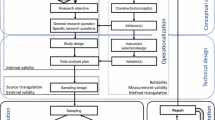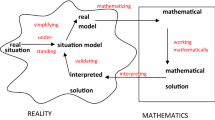Abstract
Curricula for Environmental Chemistry have become established, not only recently in the US, but also in European countries. This article discusses the current situation in Germany. German students can make their choice among four possibilities: 1. full-time studies in environmental sciences, 2. classical chemistry program followed by an environmental supplementary program, 3. classical chemistry program with a mandatory choice between environmental or ecological chemistry, 4. classical introductory chemistry followed by a major course of studies in environmental subjects.
The background of this development is the attempt to reform the German chemical curricula (Würzburger Modell) which emphasizes practice and the environmetally related subjects.
Similar content being viewed by others
References
Collins, T.: Introducing Green Chemistry in Teaching and Research: J. Chem. Educ. 1995,72, 965–966
Swan, J.;Spiro;T.: Context in Chemistry: Integrating Environmental Chemistry with the Chemistry Curriculum: J. Chem. Educ. 1995,72, 967–970
Aram, R.;Manahan, S.: Environmental Chemistry and Environmental Science. A Survey of Courses Offered in the U. S. Colleges and Universities: J. Chem. Educ. 1995,72, 977–978
Soltzberg, L.: Energy and Environment: Physical Chemistry for Environmental Science Majors: J. Chem. Educ. 1995,72, 979–980
Hartman, I.;Soltzberg, L.L.: Creating an Interdepartmental Environmental Science Major: J. Chem. Educ. 1995,72, 981–986
Lenoir, D.: Umweltchemie — Stand in Forschung und Lehre: Nachr. Chem. Techn. Lab. 1995,44, 36–39
Wegleitung für den Studiengang Umweltnaturwissenschaften an der Eidgenösssischen Technischen Hochschule Zürich: erscheint jährlich mit Begleitheften, ETH Zurich. 1996 Frischknecht, P.M.; Imboden, D.M.: Environmental Sciences Education at the Swiss Federal Institute of Technology (ETH) Zurich and Other Swiss Universities: ESPR — Environ. Sci. & Pollut. Res. 1995,2, 56–59
Studienführer Umweltschutz, Bd. 2. Fachhochschulen, 5. Aufl., Umweltbundesamt, Berlin 1993
Studienführer Umweltschutz, Bd. 1. Wissenschaftliche Hochschulen. 5. Aufl., Umweltbundesamt, Berlin 1993
Studienführer Geoökologie der Universität Bayreuth, to be ordered from the University Administration
Wiskamp, V.: Aufarbeitung anorganischer Reste aus der organischen Synthese: Chemie in unserer Zeit, 1995,29, 211–213
Nachr. Chem. Tech. Lab, 1995,43, 1198
cf. die neuen Studienführer für Umweltchemie der Universitäten Jena und Leipzig, 1995 und 1996, to be ordered at the Chemistry Departments of these Universities
Wissenschaftsrat: Stellungnahme zur Umweltforschung in Deutschland, Cologne 1994: Hempel, G.: Naturwissenschaften 1995,82, 349–359
Würzburger Modell, see Report “Neuordnung des Chemiestudiums”, in: Nachr. Chem. Techn. Lab. 1996,44, 860–863
Author information
Authors and Affiliations
Rights and permissions
About this article
Cite this article
Lenoir, D., May, R.G. Curricula for environmental chemistry in Germany. Environ. Sci. & Pollut. Res. 4, 235–240 (1997). https://doi.org/10.1007/BF02986354
Issue Date:
DOI: https://doi.org/10.1007/BF02986354




